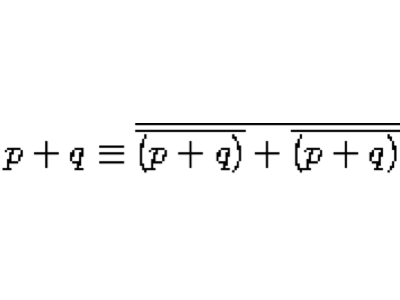Logic
I don’t know if any of you remember this little guy from high school Math. I remember, even then, how strange I found this whole operation: teaching logic. As a teacher myself, I often have to explain how one way, one process, or one explanation is logical and another is simply confused.
The same high school education later exposed me to a book that warned against the “tyranny of logic” (his words, not mine) that would constantly limit our world if we let this little equation go too far. So, where is it? What is logic’s place in the world (especially with regard to artists)?
The larger question: where does the artist find himself or herself in the larger societal structure that values logic over more “artistic” virtues?
The playwright Maria Irene Fornes apparently once said that it was bourgeois guilt that makes a writer believe he or she has to work every single day. Now, I didn’t hear her say this (since she is but one member of a long list of writers I have never met and, let’s face it, probably never will). But, she did write Mud, and I tend to think a statement like that reflects her thinking pretty well. Are we, as artists, trapped in the rat race by focusing on our production (our “numbers,” if you will)? Should we find some other way to gauge our successes and failure? Is there no possible way to gauge success and failure? Is it all part of an organic whole that shouldn’t be judged but accepted for what it is? Now, I know that I am way too bourgeois for that. I need something. I need the sense of accomplishment.
Just how long can you fly in the face of rejection, anonymity, misrepresentation, or any of the other sins against art we all see day to day?
I try to think of Marcel Proust, sitting in his bed day after day, writing his impossibly long novel without changing course despite romantic failures, depleting resources, the loss of family, and deteriorating health. Sure, internally, he was ravaged by the same paranoia, guilt, boredom, and terror that most people face in their life, but he kept doing it. His father, a doctor who published a book on women’s exercise, sold more copies of his book than Marcel in both of their lifetimes. It so happens that Dr. Proust’s book is no longer available, and Marcel has people dunking madeleines in lime tea almost a full century later. Art triumphs once again.
But this may be of little comfort to you or me, sitting at our desks, most likely not producing the next hot 3,000 page novel (as a genre, I’m told the 3,000 page novel is dead -- replaced, sadly, by the 200 page tell-all twenty-something memoir replete with unreliable narrator and recreational drug use).
This column has ended up being more questions than answers, but I think we can all live with that. At least, for me, my father has no major book deals in the works.

State of the Arts
by Kenneth R. Frank
